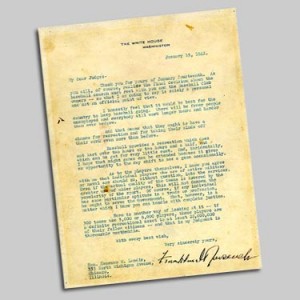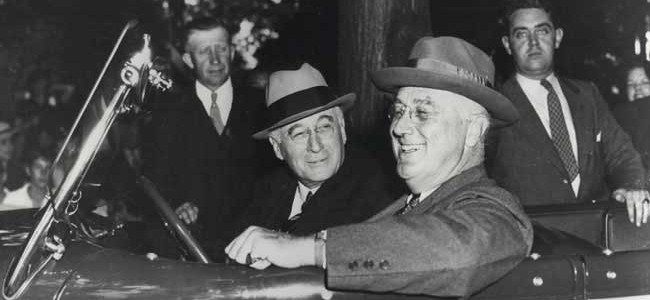 In honor of Veterans Day, I thought it might be interesting to revisit a moment in history when baseball was almost lost due to war.It was a few weeks after Pearl Harbor when baseball commissioner Judge Kenesaw Mountain Landis wrote President Franklin Roosevelt and asked him what he wanted to do about the upcoming season. “What do you want [baseball] to do?” Landis asked FDR. “If you believe we ought to close down for the duration of the war, we are ready to do so immediately. If you feel we ought to continue, we would be delighted to do so. We await your order.” Within a day, the President had penned his go-ahead answer in what has become known as the “Green Light” letter. Franklin Roosevelt realized the importance of the baseball to the nation in its time of need and the rest, as they say, is history.Today, of course, we recognize and say thank you to the servicemen and women who sacrificed so much to allow us to live free and enjoy such things as our national pastime.
In honor of Veterans Day, I thought it might be interesting to revisit a moment in history when baseball was almost lost due to war.It was a few weeks after Pearl Harbor when baseball commissioner Judge Kenesaw Mountain Landis wrote President Franklin Roosevelt and asked him what he wanted to do about the upcoming season. “What do you want [baseball] to do?” Landis asked FDR. “If you believe we ought to close down for the duration of the war, we are ready to do so immediately. If you feel we ought to continue, we would be delighted to do so. We await your order.” Within a day, the President had penned his go-ahead answer in what has become known as the “Green Light” letter. Franklin Roosevelt realized the importance of the baseball to the nation in its time of need and the rest, as they say, is history.Today, of course, we recognize and say thank you to the servicemen and women who sacrificed so much to allow us to live free and enjoy such things as our national pastime.
Here is the text of that famous letter and a copy of it is pictured here as well.
“The White House
Washington
January 15, 1942.
My dear Judge:
Thank you for yours of January fourteenth. As you will, of course, realize the final decision about the baseball season must rest with you and the Baseball Club owners — so what I am going to say is solely a personal and not an official point view.
I honestly feel that it would be best for the country to keep baseball going. There will be fewer people unemployed and everybody will work longer hours and harder than ever before.
And that means that they ought to have a chance for recreation and for taking their minds off their work even more than before.
Baseball provides a recreation which does not last over two hours or two hours and a half and which can be got for very little cost. And, incidentally, I hope that night games can be extended because it gives an opportunity to the day shift to see a game occasionally.
As to the players themselves I know you agree with me that individual players who are of active military or naval age should go, without question, into the services. Even if the actual quality of the teams is lowered by the greater use of older players, this will not dampen the popularity of the sport. Of course, if any individual has some particular aptitude in a trade or profession, he ought to serve the Government. That, however, is a matter which I know you can handle with complete justice.
Here is another way of looking at it — if 300 teams use 5,000 or 6,000 players, these players are a definite recreational asset to at least 20,000,000 of their fellow citizens — and that in my judgment is thoroughly worthwhile.
With every best wish,
Very sincerely yours,
Franklin D. Roosevelt ”

